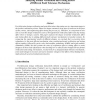Free Online Productivity Tools
i2Speak
i2Symbol
i2OCR
iTex2Img
iWeb2Print
iWeb2Shot
i2Type
iPdf2Split
iPdf2Merge
i2Bopomofo
i2Arabic
i2Style
i2Image
i2PDF
iLatex2Rtf
Sci2ools
DFT
2009
IEEE
2009
IEEE
Analyzing Formal Verification and Testing Efforts of Different Fault Tolerance Mechanisms
Pre-fabrication design verification and post-fabrication chip testing are two important stages in the product realization process. These two stages consume a large part of resources in the form of time, money, and engineering effort during the process [1]. Therefore, it is important to take into account the design verification (such as through formal verification) effort and chip testing effort when we design a system. This paper analyzes the impact on formal verification effort and testing effort due to adding different fault tolerance mechanisms to baseline systems. By comparing the experimental results of different designs, we conclude that re-execution (time redundancy) is the most efficient mechanism when considering formal verification and testing efforts together, followed by parity code, dual modular redundancy (DMR), and triple modular redundancy (TMR). We also present the ratio of verification effort to testing effort to assist designers in their trade-off analysis when deci...
| Added | 20 May 2010 |
| Updated | 20 May 2010 |
| Type | Conference |
| Year | 2009 |
| Where | DFT |
| Authors | Meng Zhang, Anita Lungu, Daniel J. Sorin |
Comments (0)

